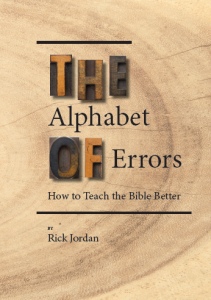Rediscovering Paul: An Introduction to His World, Letters and Theology by David B. Capes, Rodney Reeves and E. Randolph Richards. Downers Grove: IVP Academic. 2007.

The typical lay person may not know it, but Paul has gotten a pretty bad rap lately. It is as if all of Western Civilization’s problems are due to Paul – anti-Semitism, male chauvinism, and any other number of –isms seem to find their roots in Paul’s teachings, according to some. Paul, of course, was not perfect. But, his interpreters have not always been true to Paul’s original intent. And, nearly 2000 years later, it is difficult for us to place ourselves in the settings and culture that Paul ministered within. We may even find ourselves to be too comfortable with Paul, as one of the authors of Rediscovering Paul was:
“I had a nice, modern Paul, properly trained from centuries in Europe. I liked him. More importantly, I felt comfortable with him…He was a well-domesticated, Western, conservative Paul – one who did not mind that black and white Christians met in separate churches or that I owned an iPod and an Xbox while other Christians lacked school supplies…My own denomination helped. It printed Scripture passages in our Sunday school booklet…nicely avoiding those troubling verses on tongues, healings, and miracles. But then I moved to Borneo and discovered they had a different Paul.” (13)
There are many books written about Paul every year. These three authors wanted to contribute to the discussion by writing a textbook for the college or divinity school student with the goal “to present an overview of Paul that gathers together context, content, and theology with the goal of answering that perennial question of students, ‘so what?’” (16)
The authors begin with a look at the Mediterranean world of Paul. For example, they note, “it is impossible to understand Paul’s world without recognizing the role of honor and shame. Students new to biblical studies often struggle to see how it could be so important, and yet ‘honor contests’ were probably instrumental in leading Jewish authorities to crucify Jesus.” (16)
They next look at Paul’s letters – how his letters were similar to and also differed from other contemporary letter-writers.
Paul’s context of ministry is reviewed next. The authors take the more conservative stance of accepting Luke’s account of the early church over the testimony of Paul’s comments in his letters. They also trust that if a letter says it is from Paul, it is from the pen of Paul.
Paul’s life is outlined in three phases: his conversion and call, his itinerant ministry, and his ministry from prison.
Then, there is a commentary on each of Paul’s letters. It is not a verse by verse commentary but a thought-by-thought examination with sidebars to elaborate on particular issues or to address the “so what?” questions.
Like any commentary, the authors will not confirm every belief you might currently hold. For example, the rapture is called a distortion of Paul’s teaching. “Such is the plot of million-dollar bestsellers – but it is not the stuff of biblical teaching on the end times. There is no evidence that Paul believed in a secret rapture; there is no biblical basis to believe that the church will avoid the great tribulation.” (133) The book does take conservative stances on issues related to gender and sexuality. There is no attempt not to say “he” for God, for example, and homosexuality is called a “distortion of the created order.” (305) On the other hand, the authors affirm social justice in some areas, giving no space for prejudice or for complacency about poverty. “Racial, sexual, religious, social, economic, and educational barriers threaten Christ’s church in our time. As Paul proclaims the radical unity of Jew and Greek in one body for his day, he announces a revolutionary vision in which Christ’s new creation dismantles the old nature with its prejudices, enmities and strife that divide contemporary churches.” (231)
I am finding this text to be enriching and enlightening. I believe that it would be a helpful resource to a lay Bible student, particularly one responsible for leading a Bible study.

